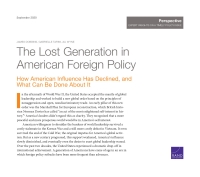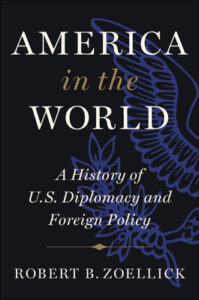 This century’s international setbacks have led many Americans to question the most basic tenets of modern foreign policy, including the value of alliances, the promotion of democracy, the benefits of free trade, and the continuous development of a rules-based order in furtherance of those objectives, according to a new RAND analysis:
This century’s international setbacks have led many Americans to question the most basic tenets of modern foreign policy, including the value of alliances, the promotion of democracy, the benefits of free trade, and the continuous development of a rules-based order in furtherance of those objectives, according to a new RAND analysis:
In the aftermath of World War II, the United States accepted the mantle of global leadership and worked to build a new global order based on the principles of nonaggression and open, nondiscriminatory trade. An early pillar of this new order was the Marshall Plan for European reconstruction, which British historian Norman Davies has called “an act of the most enlightened self-interest in history,” America’s leaders didn’t regard this as charity. They recognized that a more peaceful and more prosperous world would be in America’s self-interest.
But as a new century progressed, this support weakened, America’s influence slowly diminished, and eventually even the desire to exert global leadership waned, say analysts James Dobbins, Gabrielle Tarini and Ali Wyne, a former NED Penn Kemble Fellow. Over the past two decades, the United States experienced a dramatic drop-off in international achievement. A generation of Americans have come of age in an era in which foreign policy setbacks have been more frequent than advances, they write in The Lost Generation in American Foreign Policy: How American Influence Has Declined, and What Can Be Done About It.
Future US foreign policy will likely be driven by the values and interests of Generation Z, the cohort of young people born after 1997, and Millennials born from the early 1980s up until around 1996, says analyst Jake Mercier.
According to a study by the CATO institute, “Millennials and Generation Z are also less worried about foreign threats than their elders, including terrorism, Islamic fundamentalism, and the rise of China, he writes for RealClearDefense. And as a recent study by the Center for American Progress found, just 45 percent of Millennials and Generation Z agreed that the United States is stronger when it “takes a leading role in the world” compared to 59 percent of Baby Boomers and the Silent Generation.”
 When it comes to advancing democracy, the U.S. should “aim lower” or simply aspire to ensure what Stanford’s Stephen D. Krasner (right) calls “good enough governance,” according to some observers.
When it comes to advancing democracy, the U.S. should “aim lower” or simply aspire to ensure what Stanford’s Stephen D. Krasner (right) calls “good enough governance,” according to some observers.
“U.S. interests and values, particularly when it comes to transforming the governance and political institutions of other countries, are almost always at odds with one another. Not only does America lack the capacity to reconcile them, but it also may not always be prudent to try,” argue Aaron David Miller and Richard Sokolsky.
“American exceptionalism, particularly when it comes to exporting our values and way of life to others, stops at the water’s edge,” they write for The American Interest. “The values we proclaim may well be universal in the abstract, but they are also a unique product of our history, geography, and political system. They are not made for export.”
Cohesive strategy
 “A foreign policy agenda for 2021 should start at home—but then look beyond,” Robert B. Zoellick writes for Foreign Affairs. “The president can signal U.S. leadership with an international agenda that rests squarely on his domestic priorities.” Such a “combined program offers … a cohesive strategy, rather than a long roster of individual items.”
“A foreign policy agenda for 2021 should start at home—but then look beyond,” Robert B. Zoellick writes for Foreign Affairs. “The president can signal U.S. leadership with an international agenda that rests squarely on his domestic priorities.” Such a “combined program offers … a cohesive strategy, rather than a long roster of individual items.”
Prospects for a renewal of American international influence depend on two factors, the RAND analysts contend:
- First, that more needs to be done to persuade skeptics that working for a more peaceful and more prosperous world is in America’s national as well as their personal interest.
- Second, that sustained public support for constructive international engagement requires cooperation across party lines. In its absence, successive administrations will reverse the policies and expunge the achievements of their predecessors, ensuring that the United States remains, as it has become, reliably unreliable. RTWT







